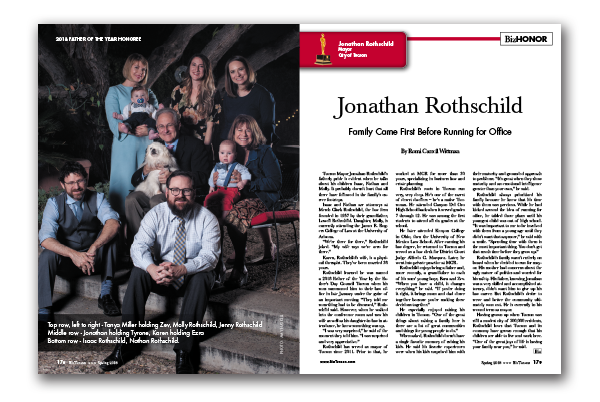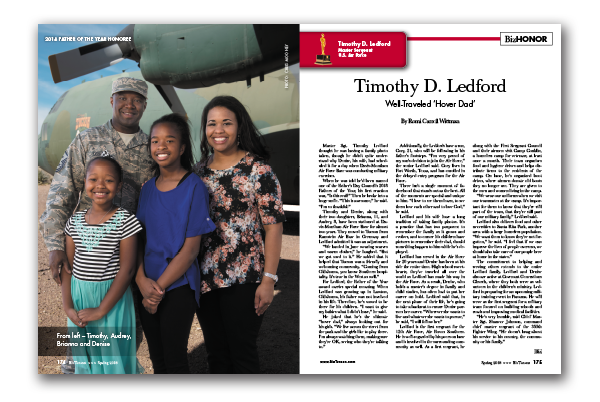
Maj. Gen. Edward P. “Ted” Maxwell
By Valerie Vinyard –
2017 FATHER OF THE YEAR HONOREE
Ted Maxwell understands the sacrifice that military parents make in serving their country.
He entered the Air Force Academy at 18, determined to be part of something bigger than himself and looking forward to being immersed in a culture of academic and physical competitiveness and growth.
Each phase, each promotion and each subsequent assignment over 33 years of military service has brought its own rewards and successes − and challenges.
He lost a close friend to an aircraft accident in his first F-16 fighter unit. The pilot’s wife was six months pregnant at the time, and Maxwell was deeply touched by how the other military families rallied around the widow to support her as she carried her baby to term on base.
In his own case, his son was born while Maxwell was serving as an F-16 instructor pilot at Hill Air Force Base in Utah. Four months later, he deployed for five months. In all, he was gone nearly two years of the four-year assignment.
“It is so important for a military parent to have the critical support of their spouse who stays behind to make sure the children are safe, healthy and cared for, but also to know the way the whole military community will step up to support each other when someone is deployed,” said Maxwell, who serves as commander of the Arizona Air National Guard, as well as president of the
Southern Arizona Leadership Council.
“The military views itself as a family,” Maxwell said, “and that really epitomizes the bond in the military that is very unique.”
He relied on that kind of global support in raising his children, Alexandra, 27, Charlie, 25, Nick, 20, and stepdaughter Alicia, 14. “When we came to Tucson, the kids always felt they had multiple parents, in a way, because we had such close friends that there were always other sets of eyes, watching, supporting and encouraging. It’s not impossible to raise kids if you don’t have that kind of support, but it’s a lot more difficult.”
The same model can work in the larger community, said Maxwell, who came to his role with SALC as he transitioned from full-time military to serve in a more traditional, part-time Guard role.
“When Katie and I got married seven years ago, I am not sure if she knew what to expect,” Ted said. “But without her support and mutual desire to improve our community, I would not have been able to successfully transition into my new role and continue to serve in the military.” They demonstrate their belief in being involved through his work at SALC and hers at University of Arizona, as well as their volunteer board service with the Arizona Town Hall and the Community Food Bank of Southern Arizona.
“What I liked about SALC was the commitment to improving the quality of life for all by promoting a vibrant economic and business environment. Everything from healthcare to infrastructure to innovation and education – these are all necessary if we are going to support the quality of life and economic health that this region deserves.”
The leadership council has prioritized education, and Maxwell said there is much that business can do locally, even as policy discussions happen at the state level about resources and achievement.
“Much like raising kids, it’s all about being involved,” Maxwell said. “The reality is, we’ve got great schools in this region and there are some that could use more support and involvement from the community. Ultimately, we all have to care about the success of our children.”
He’s been fortunate that his two eldest are working here, while Nick is in school at Northern Arizona University. “I would love to have an environment in which children want to grow up here and stay here to build their careers and create their own families. Ensuring we have quality education and plentiful job opportunities is part of making this community better,” Maxwell said.
The greater Tucson area might do well to model the military’s sense of cohesion, he said.
“We need to all be rowing in the same direction to achieve anything. If we’re all rowing in different directions, the boat isn’t going to move. From years of watching the efforts by the military and its approach, I truly believe if we embrace that ‘one-team’ mantra in this community, there’s so much more we can achieve.”
Has he seen an evolution over his tenure?
“We’ve had some successes and with success, we’re able to bring more people together to have conversations and work to common goals. It’s getting better and there’s a great deal to be proud of.”





